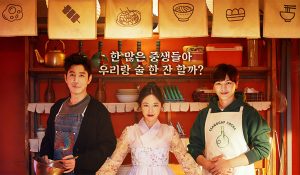
With its drama repertoire becoming increasingly solid and diverse, JTBC has added a new Wednesday-Thursday time slot to its drama broadcasting schedule. Mystic Pop-up Bar, the latest drama to be adapted from an eponymous webtoon, ushers in this new slot. With its mix of slice of life tales and a supernatural premise, it seems poised to deliver laughs and heartfelt moments in equal doses.
Editors Karen and Qing discuss how Mystic builds up its fantasy storyworld, the socio-political realities that its episodic stories are rooted in, and some of its charms despite its shaky start.
Qing: Mystic‘s premise is an interesting, if slightly familiar one: in a magical pojangmacha, a feisty lady, Weol-ju (Hwang Jung-eum), helps her patrons to work through their han—a deep-seated, yet often unspoken sense of grief and unfairness.
The idea of resolving emotional wounds from life’s hardships recalls Reaper’s work in Goblin, and the fact that Weol-ju’s work is penance for an unexplained past crime drew some comparisons to Man-wol of Hotel Del Luna. Although the premise isn’t new, the show drew me in with its promise of heartfelt stories. The promotional material also highlighted elements of the buddy film and an outlandish comic tone that set Mystic apart from its drama contemporaries.
In the genre of fantasy, world-building is essential. Karen, you’ve watched Hotel Del Luna before and had a lot of praise for it; how did Mystic‘s exposition stack up? What did you think of the rules and laws that we were introduced to?
Karen: As you mentioned, Mystic holds many similarities with a show like Hotel Del Luna, though it certainly pales in comparison in terms of convincing me of the world it has built. Sad to say, six episodes in, the rules within the fictional realm of Mystic continue to be flimsy.
For a drama like Mystic which deals heavily with the dream world, the world of the living, and the afterlife, that’s a lot of laws to be set into place. Yet, I constantly have questions as to how much can be done within the dream world and whether anything that is done within the dream world can have real-life repercussions. If the drama centers around relieving the grievances of the living, merely interfering with an intangible realm of dreams can come off as quite futile and illogical at times.
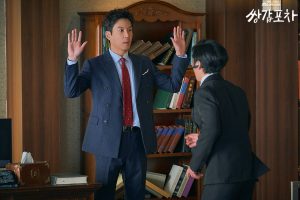
This doubt became especially prominent in episode 3, when the pocha trio tried to unravel the corruption behind Sangil Hotel’s employee recruitment. This particular story revolved heavily around information collection, and the trio’s interactions in the dreamscape with side characters outside of the dreamer’s knowledge failed to make sense.
Such unstable dealing with the laws of the various supernatural realms within the drama stuck out like a sore thumb for me. The rules of the dream world seemed to morph in ways that made it convenient for the plot to progress. Maybe I’m nitpicking, but these inconsistencies made it hard for me to immerse myself in the world of Mystic.
As you mentioned, Mystic is composed of a collection of stories, a framing that allows for the exploration of various tones with each customer’s situation. A narrative strategy like this requires a careful treatment to ensure the drama remains cohesive. What are your thoughts on this style of storytelling?
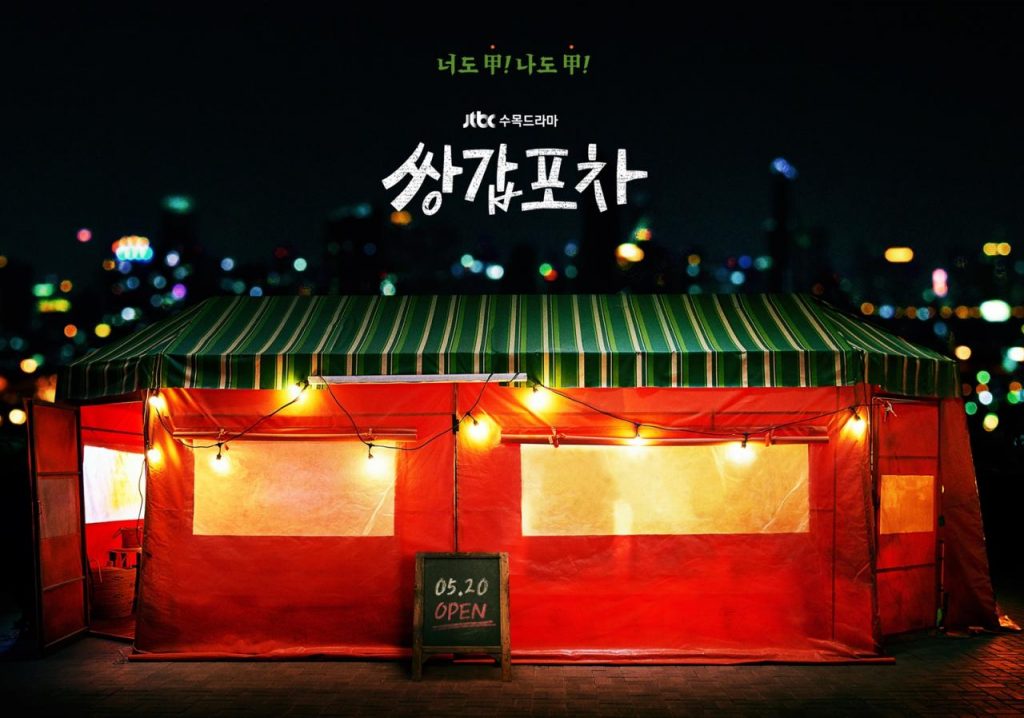
Qing: In theory, I love Mystic‘s Korean take on the Midnight Diner style tapestry of stories. Pochas aren’t just a place for you to eat; they are a culture. For many Koreans, especially the baby boomer generation who grew up frequenting pochas, a pocha is where they go to connect, “to ask for advice, and to discuss life in general with the owners”. Weol-ju notes bitterly in episode 1 that it is a dying culture: young people don’t come to pochas anymore with more convenient options like delivery, and when they do, they keep to themselves.
In addition to this backdrop of pocha culture, Mystic‘s stories are often grounded in socio-political realities. The first few stories depict grievances stemming from the customer’s social standing: Mi-ran (Park Ha-na) is mistreated for working as a promoter in a supermarket, Byeong-jae (Oh Kyung-joo) loses a job opportunity due to corrupt “parachute” hiring practices, and Kang-bae’s friend at work, Jin-dong (Ahn Tae-hwan), just barely makes ends meet for being born into a working-class family.
These stories recall the reality that upwards social mobility is nearly impossible in modern Korea, compelling the younger generation to coin the term “Hell Joseon“. The despair and fatalism created by such rigid social stratification is well-explored in films like Parasite. This premise is fertile ground for social commentary, or at least heartfelt stories of hardships with no easy resolutions.
Note: The next paragraph contains brief mentions of sexual harassment.
And yet easy resolutions are what Mystic flippantly delivers. In response to Mi-ran’s traumatic encounters with a superior who sexually harasses her, the pocha trio encourage her to speak up about his crimes, resulting in a fairytale ending of his removal from the workplace. The victim, this resolution implies, must speak up if she wants to stop suffering. This ignores the reality that victims of such crimes often do not, or cannot, speak up because their experiences are downplayed or they are outright told to stay silent.
Another ending that was too idealistic was Byeong-jae’s rightful appointment for the job he lost due to the management’s corrupt hiring practices. The auditing and investigation of white collar crimes is hardly something that happens overnight. Further, just because people in power are arrested and put on trial, doesn’t mean they can’t find ways to wriggle free from legal repercussions.
While Mystic‘s heart is in the right place, it suffers from clumsy execution, undercutting the weight of its stories. Did you notice anything else that compromised your viewing experience?
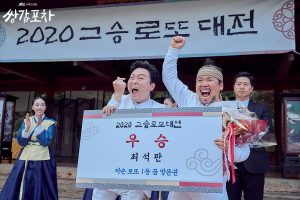
Karen: Mystic is indeed a tapestry of stories, making room to explore a range of genres depending on each story. The drama gives us anything from the historical drama style when Jin-dong’s ancestor tries to fight for a change in Jin-dong’s current social status (episode 4), to corporate melodrama mixed with modern day stunt actions in the Sangil Hotel controversy (episode 3).
The mix of genres can be entertaining and add dimension to a drama, but Mystic messes up this game of genre roulette pretty badly. Content-wise, the stories might base themselves off socio-political discussions, but the shifts in genres are poorly handled. Lacking in an overall consistent tone, scenes cut to each other with abrupt shifts in mood. One moment, it could be a melodrama, and the next, the scene can shift to a light-hearted youth romance style of filming and acting.
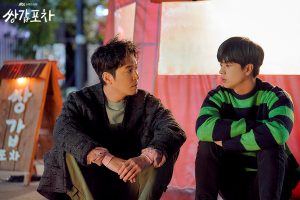
As the genres hop from one to another, my immersion in the drama becomes ever more disjuncted. In the first couple of episodes, these choppy transitions happened between scenes, but in the more recent episodes, the shifts in tone began occurring within the same scene. The poorly managed threading in terms of visual presentation is giving me an experience of getting hustled back and forth between cut-up fragments; I am getting a sense of a drama being built upon shaky foundations, revealing itself as a production that has set its aspirations too high, rather than focusing on developing its existing charms.
Despite the derailing in terms of filming and editing, I have to applaud the drama for offering charming characters, ones who continue to spark interest and whose interactions remain ever heartening. It is the appearance of female bodyguard, Kang Yeo-rin (Jung Da-eun), who remains mysteriously immune to Kang-bae’s magical touch, that made me pumped to press on with the drama. Of course, the pocha trio’s endless banter and antics never fail to make me laugh as well.
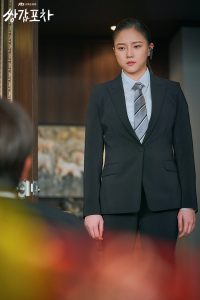
Admittedly, the appeal of Mystic’s characters do little in redeeming the show at this point, but they do stand out as a gleam of hope in this rocky genre whirlwind. What do you think, Qing? Is there anything that stands out about other elements of the drama that offers some hope amidst its clumsy execution?
Qing: Mystic is strongest when it taps on comedy. Aside from the humour of the trio’s dynamics, the show makes excellent use of cartoonish sound effects—a memorable example is the celebratory jingle (like something you’d hear when you win a round of a 90s computer game) that plays whenever the pocha trio succeed in increasing the counter tracking the number of people they help.
These sound effects also support the strong comic acting from our pocha trio, such as when Manager Gwi tries to stop Weol-ju from yelling at Chief Yeom (Lee Joon-hyuk). The back-and-forth between the two confuses him, and he accidentally uses informal speech and shouts “Hey!” at Chief Yeom instead of Weol-ju. The moment is punctuated by the screech of brakes, sealing the hilarity of Manager Gwi’s shocked face and Chief Yeom’s wronged expression.
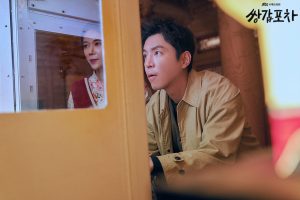
The episodic nature of Mystic also means that the next story can be better than the last. The episodic stories are, thankfully, becoming stronger: by focusing on smaller familial issues, episodes 5 and 6 provide more space for us to sink into the customers’ emotional worlds and their heart-rending struggles. The lofty, idealistic resolutions give way to more realistic endings: attaining closure after the sudden death of a loved one, and a chance at parenthood.
With Kang-bae and Yeo-rin’s story unfolding, as well as more hints about Weol-ju and Manager Gwi’s past being uncovered, the plot is definitely becoming more exciting. I’m looking forward to discussing the overarching plot and the character arcs of our trio.
(YouTube. Images via JTBC. Channel NewsAsia, Korea Expose, Korea Herald [1][2], Korea Times [1][2])


